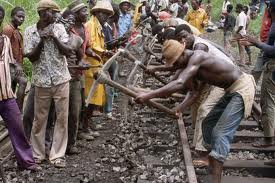By Joshua SOWU
It was a journey of field-trip data collection by the Institute of Financial and Economic Journalists (IFEJ with Sponsorship from STAR-GHANA) to get first-hand information on the budget statement’s impact in focus areas such as cocoa, timber, railway, oil and gas as part of the 2013 Budget Statement Advocacy project. I will emphasise railways and timber for this first in a series of stories.
An estimated 80% of railway workers in Ghana have been pencilled for retrenchment based on a labour rationalisation report prepared for Government. The report recommended an amount of over GHS120 million should be provided for the 1,860 staff slated for retrenchment. There is a strong reaction from the 2,300 workforce of the Ghana Railway Corporation.
Many commented that instead of resorting to job-cuts, Government should secure a loan facility to revamp the Railway Company. Government should allocate via the budget statement everything in its power help the industry.
A 76-year old activist, who wants to remain anonymous, alleged that some politicians virtually pushed the corporation into collapse by favoring their own trucks to take over the haulage of bauxite and manganese from the mining companies operating in the region.
Locals say President Rawlings faced a similar situation and he managed to secure World Bank loan to put the railway on its feet by rehabilitating only the western railway line. He was able to exceed the target of haulage for bauxite and manganese given by Government. Railways remains the main source of employment in the Western Region and Sekondi-Takoradi is already faced with mounting unemployment emanating from the closure of many factories: including Paper Conversion, Western Veneer and Lumber Company, Prime Wood, and Western Casting.
With the introduction new wagons, the railway the company is now able to cart 90,000 tonnes of manganese from Nsuta to Takoradi using the same workforce. Clearly, the problem is not the workforce but the needed investment that will make the railway grow.
Samuel Quansah, a 56-year old former railway worker who lives in the dilapidated railway quarters building, says the rehabilitation of the railway system is a strange thing because construction of the railways tracks will not be profitable. His reason is that Ghanaians living in and around the Sekondi metropolitan area no longer have the luxury of time to wait for a train when they can quickly get to their destinations by road in taxis and ‘trotros’.
He bemoans the inability of the new Railway Authority to include the current and former workers of the railways corporation into rehabilitation of the railways. He alleges that the decision was taken by Government and the construction company in Accra - and before they knew, workers from Accra had arrived to work on the rail tracks. “We were not consulted,” he laments.
The Railway Workers Union Location Branch Chairman, who doubles as the Assembly member, Samuel Kodjo Mensah, believes that rehabilitation of the railways system is not a fluke. “This is not a 419, it is genuine; it will bring benefit to the people and I am happy Government has taken this bold decision," he said.
Emmanuel Alhassan, Human Resources Manager of Ghana Prime Wood Company Limited, located at Sekondi, said: “We rely heavily on diesel and electricity. In 2011/12 when utility prices went up, a lot of the companies in the timber industry in Sekondi-Takoradi collapsed. Ours is not an exception, but management is doing everything to keep the company going.
“Our company paid electricity bills of about GHS75,000.00 a month, and the increase brought this to about GHS330,000.00. We had to sit down with ECG to come to an amicable solution to settle it piece-meal, but it fell on rocks. We have about 100 heavy-duty trucks that rely on diesel. We then had 1,500 employees.
“With all this happening, in June 2012 management was forced to lay-off all 1,500 workers - keeping only 350 to keep the company running. At the time we entered the premises - at 2pm - workers have already closed; they work at 8am-2pm in order to avoid the high cost of generator operation because of fuel-use and power fluctuations.
“The 350 were also laid-off before they called back. Every day, we have to buy GHS5,000.00 worth of fuel to power our generator for work. In view of this, we had to rationalise the use of our generator. Because of our situation, we are forced to start work at 6am and close at 2pm.
"This is just to keep the company afloat. We await new measures from Government, such as soft loans, to revamp our industry.
“Now that the Oil has come, Government has forgotten about the timber industry; but it is the industry that employs the largest number of people. We had more than 10 timber companies, but it is left with about four operating under capacity. They include Metro, DuPaul, and Ghana Prime Wood. These are also using a skeleton staff.
“Overseas, when companies are in distress, Government comes to their aid. Why can’t government do the same here in Ghana?
“Our MD Mr. Ben Kuffour is doing all he can to keep the company alive. We are a free zone company, so government derives a lot of taxes from us.”
The writer is a member of the Institute of Financial and Economic Journalists
Business News of Friday, 3 May 2013
Source: B&FT
FEATURE: The cry of a dying industry

















